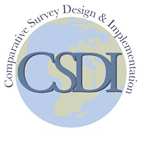- Home
- About us
- Initiatives
- Events
- 2024 CSDI Workshop
- Past Events
- 2023 CSDI Workshop
- 2022 CSDI Workshop
- 2021 Virtual CSDI Workshop
- 2019 CSDI Workshop
- 2018 CSDI Workshop
- 2017 CSDI Workshop
- 2016 3MC Conference
- 2015 CSDI Workshop
- 2014 CSDI Workshop
- Archive
- Forum
- Additional Resources
- Contact Us


Questionnaire Translation and Language Issues in Survey Research: Detecting Problems and Suggesting Solutions
Working Remotely with Translation Teams in Implementing TRAPD: Practical Considerations
Alisu Schoua-Glusberg, Research Support Services
Surveyspeak versus Translatability: Can Gunning Fog Index Inform Questionnaire Development?
Danuta Przepiórkowska, University of Warsaw
A New Look at Types of Probes for Testing Translated Instruments
Alisu Schoua-Glusberg, Research Support Services
Advance Translations Used to Enhance the Translatability of the Source Questionnaire in the ESS: Confirmation of the Usefulness in a Think-Aloud Study into French and German
Brita Dorer, GESIS-Leibniz-Institute for the Social Sciences
Mechanisms of Close versus Free Questionnaire Translation: Qualitative Findings from an Experiment in Estonian and Slovene
Brita Dorer, GESIS-Leibniz-Institute for the Social Sciences
Comparability of Measures
The Total Survey Error Paradigm and Comparison Error: A Component-Level Evaluation
Tom W. Smith, NORC at the University of Chicago
Regular o Pasable: Improving Measurement Properties of Self-Rated Health for U.S. Latinos through Alternative Translation
Sunghee Lee, University of Michigan
Measuring School Children’s Attitudes towards Minorities in Poland and Switzerland
Charlotte Clara Becker, University of Cologne
Household and Personal Income Measures in Cross-National Survey Projects: Assumptions, Usability and Comparability
Marta Kołczyńska, Institute of Philosophy and Sociology, Polish Academy of Sciences
Interviewer Variations & Training
Measuring Interviewer Compliance with Regard to Question Deviations in a Multi-Language Survey in Zambia
P. Linh Nguyen, University of Essex; University of Mannheim
Development of Bilingual Interviewer Training at the U.S. Census Bureau
Patricia Goerman, U.S. Census Bureau
Why do Interviewers Vary on Interview Privacy and Does Privacy Matter?
Zeina Mneimneh, University of Michigan
Achieving Comparability and Translational Equivalence in Cross-Cultural Survey Research Using Technology from Natural Language Processing
Complementing Comparative Surveys Through the Use of Word Embeddings
Magnus Sahlgren, Research Institutes of Sweden
The Meaning of Democracy – Using a Distributional Semantic Lexicon to Collect Co-Occurrence Information from Online Data across Languages
Sofia Axelsson, University of Gothenburg
Lost in Translation – How Differences in Word Intensity Affect Citizens’ Satisfaction with the Working of Democracy
Stefan Dahlberg, University of Gothenburg
Measuring Issue Ownership using Word Embeddings
Amaru Cuba Gyllensten, Research Institutes of Sweden
Do Not Take Online-Mediated Text for Granted: Heuristics for Assessing Limitations of Representativity in Online Text Data
Jonas Andersson Schwarz, Södertörn University
Developing Interactive Tools for Cross-National Surveys: Results from the SERISS Project
Introducing an Electronic Fieldwork Management System in the European Social Survey
Sarah Butt, City, University of London
Documenting the European Social Survey Questionnaire Design Process Online Using the Data Documentation Initiative (DDI)
Hilde Orten, NSD – Norwegian Centre for Research Data
Challenges and Best Practices When Designing a Mobile Application for a Probability-Based Internet Panel
Geneviève Michaud, Sciences Po Paris
The Question Variable Database (QVDB): A Portal and Documentation Tool for the ESS
Benjamin Beuster, NSD – Norwegian Centre for Research Data
The myEVS Project Management Portal: A Case Study for Survey Projects
Evelyn Brislinger, GESIS-Leibniz-Institute for the Social Sciences
Mode Preferences & Differences
Possibilities of Using Declarative and Behavioral Data in Predicting Respondents Survey Mode Preference in Poland
Adam Rybak, Institute of Sociology, University of Adam Mickiewicz, Poznan
PC versus Mobile Survey: Are People’s Life Evaluations Comparable?
Francesco Sarracino, STATEC
Sample Management Systems and Sampling Innovations
Designing a Sample Management System for use in a Cross-national On-line Web Panel: Initial Thinking and Ideas
Gianmaria Bottoni, Euroepan Social Survey HQ, City, University of London
Respondent Driven Sampling for Immigrant Populations: An Application to Foreign-Born Korean Americans
Sunghee Lee, University of Michigan
Data Collection Mode Change: Going from Face to Face to CATI: The Case of Greece
Carsten Broich, Sample Solutions BV
Paradata and Quality
How Do Timestamps Improve Survey Implementation? Demonstration of PMA Analytics
Shulin Jiang, PMA2020, Johns Hopkins Bloomberg School of Public Health
Controlling and Validating Methods to Control for Response Biases in Self-report Educational Data
Marek Muszyński, Institute of Sociology, Jagiellonian University
Why Do We Prefer Second Best Quality Indicators?
Peter Mohler, Mannheim University
Results of the AAPOR/WAPOR Task Force (TF) on Quality of Comparative Surveys
Overall Goals of 3MC Research
Timothy P. Johnson, University of Illinois at Chicago
Using the Total Survey Error Approach to Assess and Reduce Comparison Error in Cross-National and Cross-Cultural Surveys
Tom W. Smith, NORC at the University of Chicago
Questionnaire Development in 3MC Surveys
Alisu Schoua-Glusberg, Research Support Services
Error Sources and Quality in 3MC Sampling and Field Implementation
Julie de Jong and Kristen Cibelli Hibben, University of Michigan
Survey Documentation in 3MC Surveys
Irina Tomescu-Dubrow, Institute of Philosophy and Sociology, Polish Academy of Sciences
Questionnaire Development and Testing
Testing Branching Techniques and Rating Scales across Countries
Aneta Guenova, US Department of State
Establishing Cross-cultural Equivalence for the European Working Conditions Survey: Cross-cultural and Multi-mode Cognitive Pretesting on Employment Status and Job Quality
Patricia Hadler, GESIS-Leibniz Institute for the Social Sciences
Evidence of the Response Processes for Extending Question-and-Answer Models in the Multi-National Web Survey Context
Jose-Luis Padilla Garcia, University of Granada
Measuring Employment and Earnings among Disadvantaged Youth: Findings from Cognitive Interviews with USAID Youth Workforce Development Program Beneficiaries in Five Countries
Mousumi Sarkar, Well World Solutions, LLC
3MC Case Studies
Implementing the TSE Framework in a Multinational Context: Lessons from Four National Surveys in the Caribbean
Ramiro Flores Cruz, Sistemas Integrales
Harmonizing Panel Survey Data for Multi-Cultural Research
Comparing Life-Course Data from Multiple National Panel Surveys: Challenges of Ex-post Harmonization
Anna Kiersztyn, University of Warsaw
Synchronize to Harmonize: Ex-ante Strategy in a Comparative Pseudo Panel Study on Birth Cohorts
Ireneusz Sadowski, Institute of Political Studies of the Polish Academy of Sciences
Constructing Occupational Careers using Panel Survey Data: Harmonization of Multiple Concurrent Jobs through Time
Zbigniew Sawiński, Institute of Political Studies of the Polish Academy of Sciences